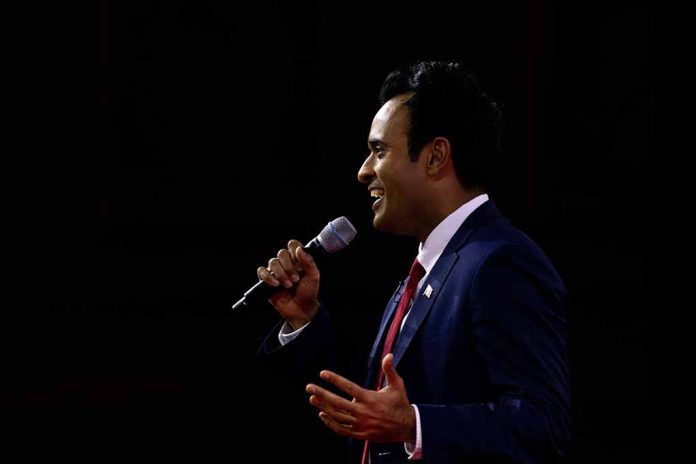
Vivek Ramaswamy delivered a biting critique of the Democratic Party on Fox News, accusing them of being under the sway of affluent elites while ignoring the plight of the poor.
At a Glance
- Vivek Ramaswamy criticized the Democratic Party on Fox News, claiming they are “screwing” over poor people.
- He described Democrats as being controlled by global elites, including Alex Soros.
- Ramaswamy linked his criticisms to foreign policy, particularly the war in Ukraine.
- He also criticized the Democratic stance on climate change, claiming it does not benefit the United States.
Ramaswamy’s Critique on Fox News
On Fox News’ “The Ingraham Angle,” Vivek Ramaswamy accused the Democratic Party of hypocrisy and of being manipulated by wealthy elites. He asserted that Democrats are failing the poor while being influenced by affluent individuals like Alex Soros. Ramaswamy pointed to a fundraiser hosted by Alex Soros for Democratic Vice-Presidential nominee Tim Walz as evidence of this elite influence.
He objected to what he termed the “puppeteering” within the Democratic Party, asserting that wealthy individuals are directing the party’s actions while professing to stand against such influence. He argued that this hypocrisy is most apparent in the Democrats’ foreign policy and climate change agenda.
This criticism ties into a broader narrative about undue elitist control and globalist pressures, factors he believes are misguiding American foreign policy. Citing the war in Ukraine, Ramaswamy suggested that Democratic policies do not prioritize American interests.
This whole “they’re weird” argument from the Democrats is dumb & juvenile. This is a presidential election, not a high school prom queen contest. It’s also a tad ironic coming from the party that preaches “diversity & inclusion.” Win on policy if you can, but cut the crap please.
— Vivek Ramaswamy (@VivekGRamaswamy) July 29, 2024
Linking Climate Change and Foreign Policy
Ramaswamy echoed former President Donald Trump’s stance on seeking peace in Ukraine, criticizing what he called the “global establishment” for perpetuating the conflict. He argued that the current Democratic approach does not serve American interests.
“So look, I have no objection to being a billionaire, speaking to somebody who has lived the American dream myself,” Ramaswamy told Laura Ingraham. “But what I do have an objection to is the kind of puppeteering that you see now in the Democratic Party. Look at those images of Alex Soros standing next to Tim Walz. Looks like if you squint really closely, you can even see the puppet master pulling the strings right there… Nowhere do we see this more pronounced than in our foreign policy. I think this war in Ukraine does not best serve American interests and Donald Trump is right to want to bring peace to that conflict.”
Ramaswamy also criticized the Democratic approach to climate change, asserting that the current policies do not benefit the United States. He claimed that these globalist agendas undermine American interests and are influenced by the same elite individuals who control other aspects of the party’s actions.
Project 2025 and Democratic Hypocrisy
Speaking on NewsNation’s “The Hill,” Ramaswamy criticized the Democrats’ portrayal of Project 2025 as a Republican strategy to consolidate power. He likened it to their treatment of Russian interference in the 2016 election, dismissing it as another misplaced fear.
“They’ve turned Project 2025 into the equivalent of this boogeyman, like they had of Russian interference in the 2016 election,” the entrepreneur told Blake Burman on NewsNation’s “The Hill.” “That’s what they’re trying to create, this false boogeyman. I think it’s falling flat.”
He further emphasized that Democratic hypocrisy is evident in their inconsistent policy stances. He argued that while Donald Trump has made his positions clear, Vice President Harris has not provided a coherent policy vision, fueling further criticism.
This election isn’t really about Republicans vs. Democrats. It’s the managerial class vs the everyday citizen. Time to open our eyes.https://t.co/raE0K2Ua3o
— Vivek Ramaswamy (@VivekGRamaswamy) September 26, 2024
An outsider’s Perspective
Ramaswamy, a 38-year-old Ohio-based venture capitalist, presents himself as an outsider in the Republican presidential nomination race. He claims his rivals are heavily influenced by donors and special interests, a point of contention he regularly addresses in his critiques.
Ramaswamy has allied himself with influential conservative figures like Peter Thiel and Leonard Leo, arguing that their contributions are geared towards restoring traditional American values.
His connection with JD Vance, supported by Thiel, further cements his narrative of being aligned with transformative conservative leadership.
“I stand on the side of revolution,” he declares. “That’s what I’m going to lead in a way that no establishment politician can.”
His rhetoric continues to focus on the necessity of realigning the GOP’s policies to serve everyday Americans, steering away from elite control, and preserving national interests above global pressures.










